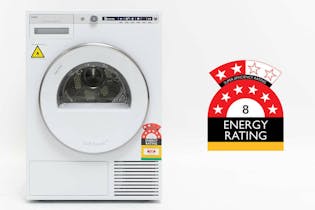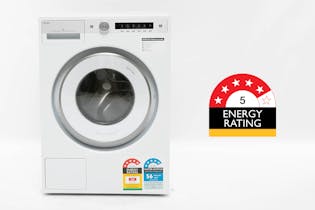How we test clothes dryers
Find out how we test clothes dryers to see how they perform and how energy efficient they are.
We’ve tested vented, condenser and heat pump clothes dryers to find which ones are fastest, most efficient and have the best features.
Lifetime score
Our overall score combines test performance (how well the appliance works and how easy it is to use) with predicted reliability (how likely models from the brand are to remain free of faults) and brand satisfaction (how satisfied owners of the brand are likely to be).
 We’ll only recommend appliances you’ll love to own, that work well and keep working well for a long time.
We’ll only recommend appliances you’ll love to own, that work well and keep working well for a long time.
Test performance
It’s no good if a product lasts for several decades if it doesn’t work well in the first place. A disappointing product will soon become unloved and unwanted. For this reason, our independent lab testing forms an important part of our overall lifetime score.
Our clothes dryer test is based on an Australia New Zealand Standard. The test uses a standard load of cotton bed sheets, small towels, and pillowcases. This allows us to compare clothes dryers fairly and repeat the test year after year.
We test using a 3.5kg load (dry weight – it gets a lot heavier when wet) at a 90% moisture level. This is about the average amount a consumer washes at one time.
Our clothes dryers test includes:
-
Drying performance: We assess how long a clothes dryer takes to finish the load and inspect the results. If the dryer fails to dry the load to less than 6% moisture content, we apply a penalty to the score. If the dryer fails to dry to less than 8%, we apply a further penalty. We apply an additional penalty if the dryer doesn’t have reverse tumbling as washing is more likely to tangle into a damp lump without this feature.
We also apply a penalty if the clothes dryer doesn’t have reverse tumbling, as washing is more likely to get tangled and remain damp without this feature.
Energy efficiency: We assess a clothes dryer’s energy usage with our test load. A higher score indicates a more energy efficient machine.
Predicted reliability
It’s reasonable to expect a new appliance to remain fault-free for at least the first five years. Our predicted reliability ratings won’t tell you whether your clothes dryer will stop working tomorrow, but it does show which brands make models that are less likely to fail.
Brand satisfaction
Satisfaction is important – no appliance should be a source of buyer regret. Appliances with very satisfied owners are more likely to get cleaned regularly and maintained well. Their owners are also more likely to seek repair for faults than look for a quick replacement.
Repairability (coming soon)
Older appliances are more likely to go wrong, but common faults should be repairable. Repairs should be affordable and convenient – parts need to be easy to find at a reasonable cost, instructions should be available, and repairs shouldn’t need hours of expert labour.
We haven’t been able to assess repairability yet, but it’s important, so we’re gathering data and forming a plan so we can start including it in our lifetime scores.
It will be challenging. We’ll need to analyse product failure data in our reliability surveys, conduct hands-on inspections to evaluate how easy products are to take apart, and investigate which brands make spare parts available at a reasonable price.
Survey data
In our reliability and satisfaction surveys, consumers tell us about faults that have made an appliance they own unusable or mean they’ve had to change how they use it. We also ask them how satisfied they are with the appliance. We use this data to produce our predicted reliability and brand satisfaction scores.
We use a statistical test to rate the relative performance of each brand. Compared to data we have for all products (of the same type) in the survey, we rate each brand with highest, high, average, low or lowest for predicted reliability and brand satisfaction respectively.
You can compare the rating of different brands for the same product type (for example, the predicted reliability rating for Miele and Haier clothes dryers), but you can’t compare the results for different product types (for example, satisfaction of LG washing machines and Samsung clothes dryers).
We analyse brands that get at least 30 responses in our survey. That means there are some brands we can’t analyse because we don’t have enough data. For those brands, we assume they have average reliability and satisfaction.
Our data is based on 1,725 responses from owners of clothes dryers in our 2024 survey.
We've tested 76 clothes dryers.
Find the right one for you.


.jpg&w=315&q=75)